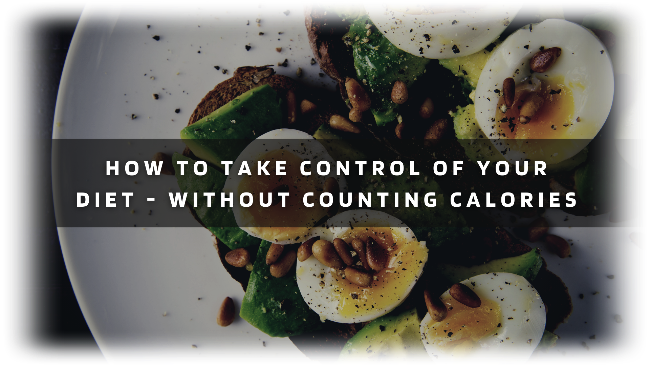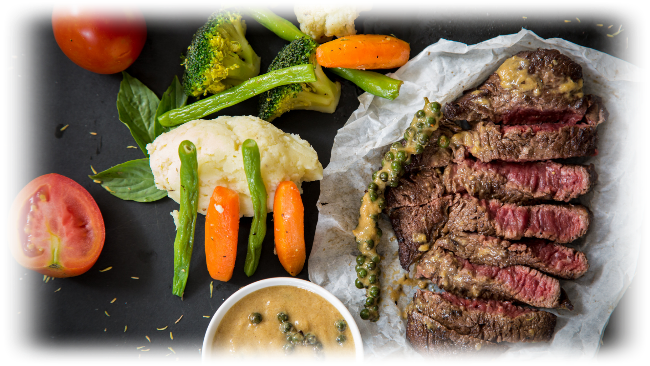Don't Want to Count Calories? No Problem.By now I think we're all pretty aware that the adjustment of your energy balance is largely what dictates whether you lose or gain weight. This means that tracking calories will always be the most accurate & efficient way of achieving your body composition goals. Additionally, the tracking process is also a solid way to grasp an understanding of the nutritional value of food - which can be a real eye-opener for a lot of people. But, with all that said, you can still see some serious results without counting calories. What's more, if nutritional optimisation is an aspect of your health that you've historically had some difficulty with, then tracking calories may not be the best approach for you; it may create feelings of overwhelm & create unnecessary pressure. So, if you're keen to improve your nutrition & adjust your body composition - without tracking calories - what can you do? Well, in this article I'm going to break-down 6 things that you can focus on. 1. Be Clear on Your Why. Before making any kind of behavioural adjustment, it's first absolutely fundamental that you clearly define your goals, establish why they matter to you, & outline the behaviours required for you to achieve them. It’s crucial to give some thought as to why your goals matter to you. Why is it you want to clean up your diet? Maybe it’s because you want to lose a few pounds. But, dig deeper still - why do you want to lose those pounds? Perhaps it’s so you can improve your health; allowing you to enjoy a longer & higher quality of life, in turn meaning you can spend more quality time with your kids & other family members. Whatever your reasoning, take 5 minutes to write it down. Ask yourself whether you want to achieve this thing because you genuinely want it, or because society has convinced you that it's something that you should strive for. Be honest with yourself here. From there, break down the daily behaviours that you'll need to carry out in order to see success. 2. Focus on Food Quality. Above all else, eat real food. What I mean by this is single-ingredient foods provided by nature, and that have been consumed by human throughout evolutionary history, like.. - Organic Fruit & Vegetables - Grass-Fed Meat - Free Range Eggs - Wild Fish - Rice, Potatoes, Quinoa - Nuts, Seeds, Beans, Lentils Aim to ensure that your diet predominantly consist of these foods, whilst limiting the amount of processed (foods with all sorts of added ingredients)/ junk foods in your diet. Doing so will ensure that you're supplying your body with the fuel it needs to be operating at it's very best. Additionally, real foods are more satiating than processed food alternatives - meaning that you'll naturally consume less. Approaching your nutrition in this way brings a whole host of benefits, including increased energy levels, improved physical & cognitive performance, improved gut health (which is SO important), reduced propensity for stress & mental disorders, & a more robust immune system. If you want to learn more about the importance of food quality, check out this article. 3. Control Your Environment. By 'control your environment' I essentially mean giving yourself the greatest opportunity to staying disciplined with your nutrition - by removing the need for willpower. Several studies have demonstrated that willpower is a finite resource; the more desires/temptation you resist, the more likely you are to give in to future desires. So, during a long day of work for instance, you’re using willpower to resist the desire of scrolling through instagram or watching cat videos on youtube (in an ideal world). By utilising willpower during the day, you're more likely to give-in during the evening. Studies have also shown that those who exert more self-control are not more successful in achieving their goals - it’s the people who plan their lives so that they don’t have to use it. The trick is to not rely on willpower as a means to success. Here's a simple trick for you to employ. Don’t buy food that tempts you to go off-track in the first place. Groundbreaking, I know. Personally, I have a sweet tooth. So, to prevent that from getting out of hand, I keep sugary snacks out of the house. For the most part I simply don’t buy them, or, opt for healthier alternatives. Couple of useful tips for ensuring this is to write down a clear list of what you're getting, & to never go to the supermarket hungry! What you'll find that is when you're aware that you have immediate access to the object of pleasure, its presence & temptation will linger on your mind. However, once you remove that easy access, the temptation gradually fades until you forget about it altogether. Additionally, I recommend keeping healthy foods that you're trying to incorporate into your diet within your visual environment. Keeping a fruit bowl (with fruit in it, obviously) somewhere that you'll regularly see it is a good example of this. 4. Eat Mindfully. One of the biggest reasons why a lot of people slip-up diet-wise is due to a complete lack of conscious consumption. Being more mindful of your behaviour is a proven method for improving nutritional discipline. Here's a few examples of what I'm talking about:
5. Cut-out the Booze. Probably the most difficult one to hear for a lot of people. This isn't just aimed at those who binge drink on the weekends, it also applies to those of you who like to enjoy a glass of wine or two each night. Whether it be fat-loss, improving health, or optimising performance, alcohol is not your friend. Let's say you wanted to lose 0.5kg of fat per week. To do that, you'd be aiming to maintain a calorie deficit of around 500 calories per day. Even if you kept your food intake on-point, drinking just 2 large glasses of wine (~450 kcals), or 2 pints of beer (~420 kcals) will more or less kill off any hopes of a deficit. What's more, the negative effects of alcohol on sleep are well documented - it massively disrupts the quality of your sleep. And I'm sure you're well aware of how you feel the morning after a heavy night. So, minimise your alcohol consumption. If it's featuring pretty consistently in your life right now, start out by taking small steps to reduce your intake (e.g. going from 2 glasses of wine per night to 1). Alcohol-free alternatives are also a good way to wean off the stuff. 6. Don't Aim for Perfection. The reality is that you aren't going to sustain absolutely perfect nutritional discipline each & every day of the year. And that's fine. Understand that your diet isn't a 6-week fad. Your diet is the food decisions you make throughout the entirety of your life. So, it makes sense to adopt a sustainable approach. Rather than attempting a complete overhaul, focus on dealing with one aspect of your nutrition at a time. That might mean spending 2 weeks focusing on getting 2-3 litres of water in each day. Then, you might spend 2-3 weeks focusing on incorporating more fruits & veg into your diet. Approaching your diet in this way, will make the whole process significantly less overwhelming & thereby increase your chances of long-term improvement. Lastly, outline some clear expectations for yourself & do your upmost to remain on-track. There is an element of discipline required - nothing worth achieving in life comes easy. But, with that said, also be sure to reward yourself every now & again - without going completely off the rails. Need Help Improving Your Diet?
CLPT
Personal Trainer in Tunbridge Wells | Personal Trainer in Sevenoaks | Personal Trainer in Tonbridge Personal Training | Personal Trainer | Tunbridge Wells | Tonbridge | Sevenoaks |
Author
Christian Lawal Personal Training.
Personal training in Tunbridge Wells, Tonbridge & Sevenoaks. Archives
January 2024
|




